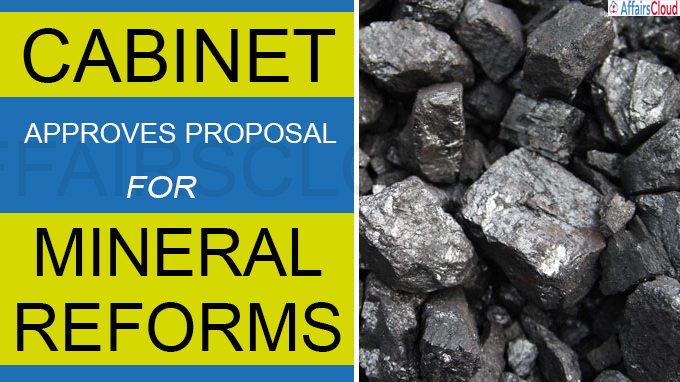 In order to boost mineral production in the country, the Union Cabinet chaired by Prime Minister Narendra Modi approved a proposal for mega mineral reforms. The major objective of the reforms is to generate huge employment opportunities, reduce imports and increase production by bringing large mineral blocks into auction.The Major reforms in mining will be implemented by amending the Mines and Mineral (Development and Regulation) Act 1957 or MMDR Act, 1957 to solve legacy issues.
In order to boost mineral production in the country, the Union Cabinet chaired by Prime Minister Narendra Modi approved a proposal for mega mineral reforms. The major objective of the reforms is to generate huge employment opportunities, reduce imports and increase production by bringing large mineral blocks into auction.The Major reforms in mining will be implemented by amending the Mines and Mineral (Development and Regulation) Act 1957 or MMDR Act, 1957 to solve legacy issues.
- The proposal is set to be presented in the Parliament during forthcoming Budget Session, starting January 27, 2021.
What does the proposal include?
- Clarifying doubt on double taxation
- Rationalising stamp duty
- Developing the National Mineral Index (NMI)
- Removing Distinction between Captive and Non-captive mines
- 50% rebate on Minerals Dispatched earlier
Following is the explanation of points under Proposal:
Amending the MMDR Act 1957 to solve legacy issues
These mineral reforms will be implemented through an amendment in section 10A (2)(b) and 10A (2)(c) of the MMDR Act, 1957.
- It will solve legacy issues related to mines by making a large number of mines available for auctions. It will also help to strengthen the auction-only regime and boost transparency in the system.
Clarifying Doubt on Double Taxation
In the current scenario, royalty is included in Average Selling Price (ASP) of minerals and then again it is computed on ad valorem basis which led to double taxation. To solve this issue a panel will be formed to examine the issue of double taxation.
Rationalising Stamp Duty
The reform will also see an amendment in the Indian Stamp Act, 1899 to bring uniformity in stamp duty calculation in various States.
- Notably, the Effective tax rate (ETR) on mining in India is approximately 64% which is the highest in the world as compared to other countries tax range between 34-38%.
Developing the NMI
Presently, statutory payments are calculated on the basis of Average Sale Price (ASP) which results in misinterpretation due to the absence of sale price data for some minerals, differences in prices across states, etc. Therefore, it is proposed to introduce an index-based mechanism by developing NMI for various statutory payments and others for future auctions.
Removing Distinction between Captive and Non-captive mines
It is also proposed to remove the distinction between captive and merchant mines. This will facilitate captive mines to sell up to 50% of the minerals excavated during the current year.
50% rebate on Minerals Dispatched earlier
A 50% rebate will also be provided in the quoted revenue share, for the quantity of mineral produced and dispatched earlier than the scheduled date of production.
Mineral Exploration:
In order to boost exploration, there will be a review of the functioning of the National Mineral Exploration Trust (NMET). NMET will be made an autonomous body.
- Private entities will be engaged in exploration works.
- There will also be Simplification of exploration regime.
Amendment in District Mineral Foundation (DMF) guidelines
Approval has also been given for amendments in the DMF guidelines in order to spend DMF funds on people living in directly affected areas.
- Local Member of Parliament (MP) will be a member of the DMF Governing Council.
Additional Info:
–The exploration activities in India are quite low. Out of the total Obvious Geological Potential (OGP) area of 0.571 million sq. km, only 10% of the area has been explored so far, and mining is carried out in 1.5% of the OGP area.
–Countries like Canada and Australia spend almost 14 per cent of global exploration expenditure; India’s exploration expenditure is approximately 0.2%.
Background:
Under the Aatmanirbhar Bharat scheme, the Central Government in May 2020 announced enhancing private investments in the mineral sector and bringing in other reforms. In this regard, the Ministry of Mines had proposed legislative amendments to the MMDR Act, 1957.
Recent Related News:
i.On the lines of the vision of digital India and Atmanirbhar Bharat, the Central Government has given its approval for provision of a Universal Service Obligation Fund (USOF) Scheme to provide Mobile Coverage in 2374 uncovered villages viz. 1683 in Arunachal Pradesh and 691 in two Districts of Assam namely Karbi Anglong and Dima Hasao by December, 2022.
ii.The Union Cabinet has approved the proposal of the Department of Telecommunications (DoT), Ministry of Communications to conduct spectrum auction worth Rs. 3,92,332.70 crore (at reserve price) to offer a total of 2251.25 MHz (Megahertz) to successful bidders for providing commercial mobile services.
About Ministry of Mines:
Union Minister– Pralhad Venkatesh Joshi
Headquarter– New Delhi




